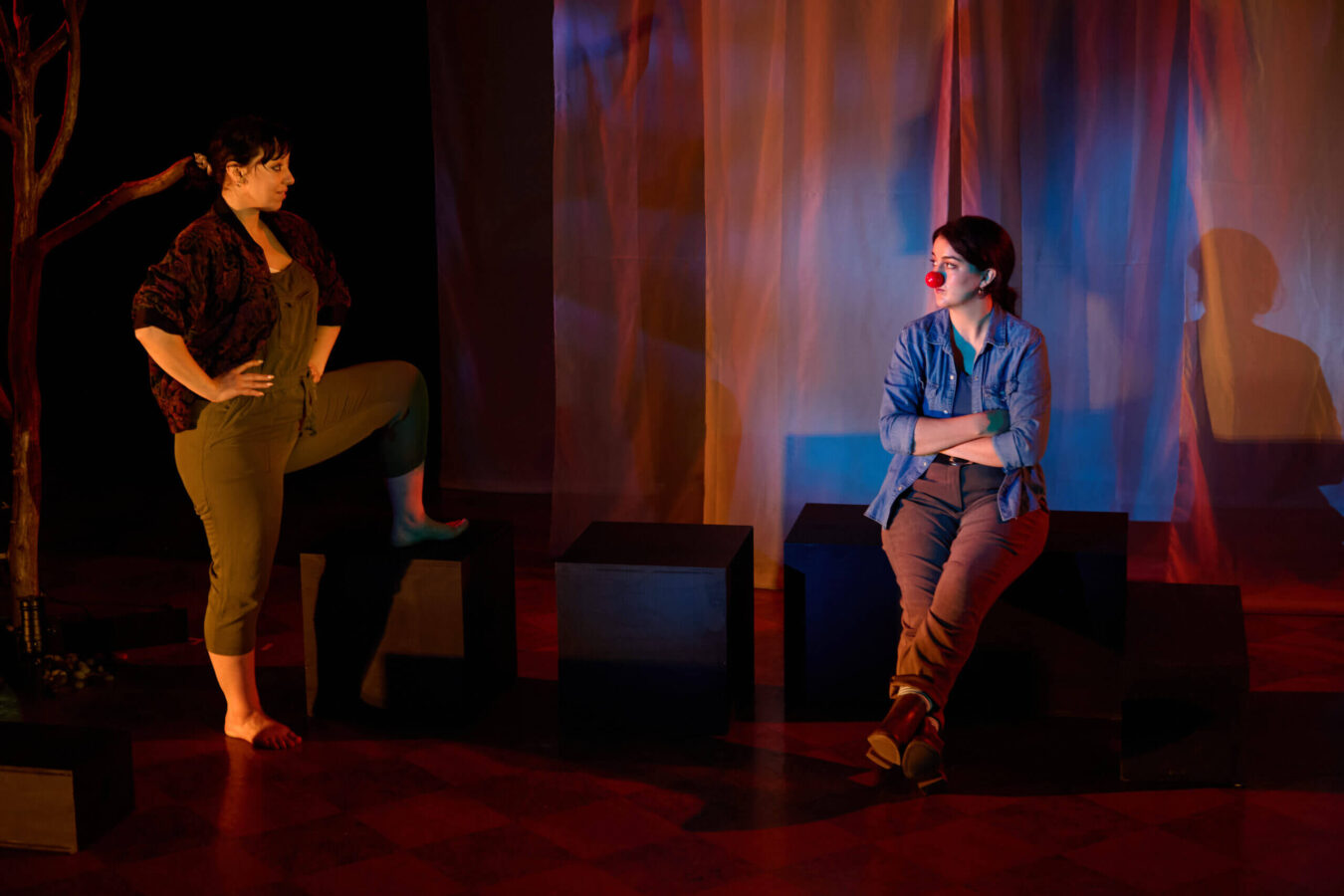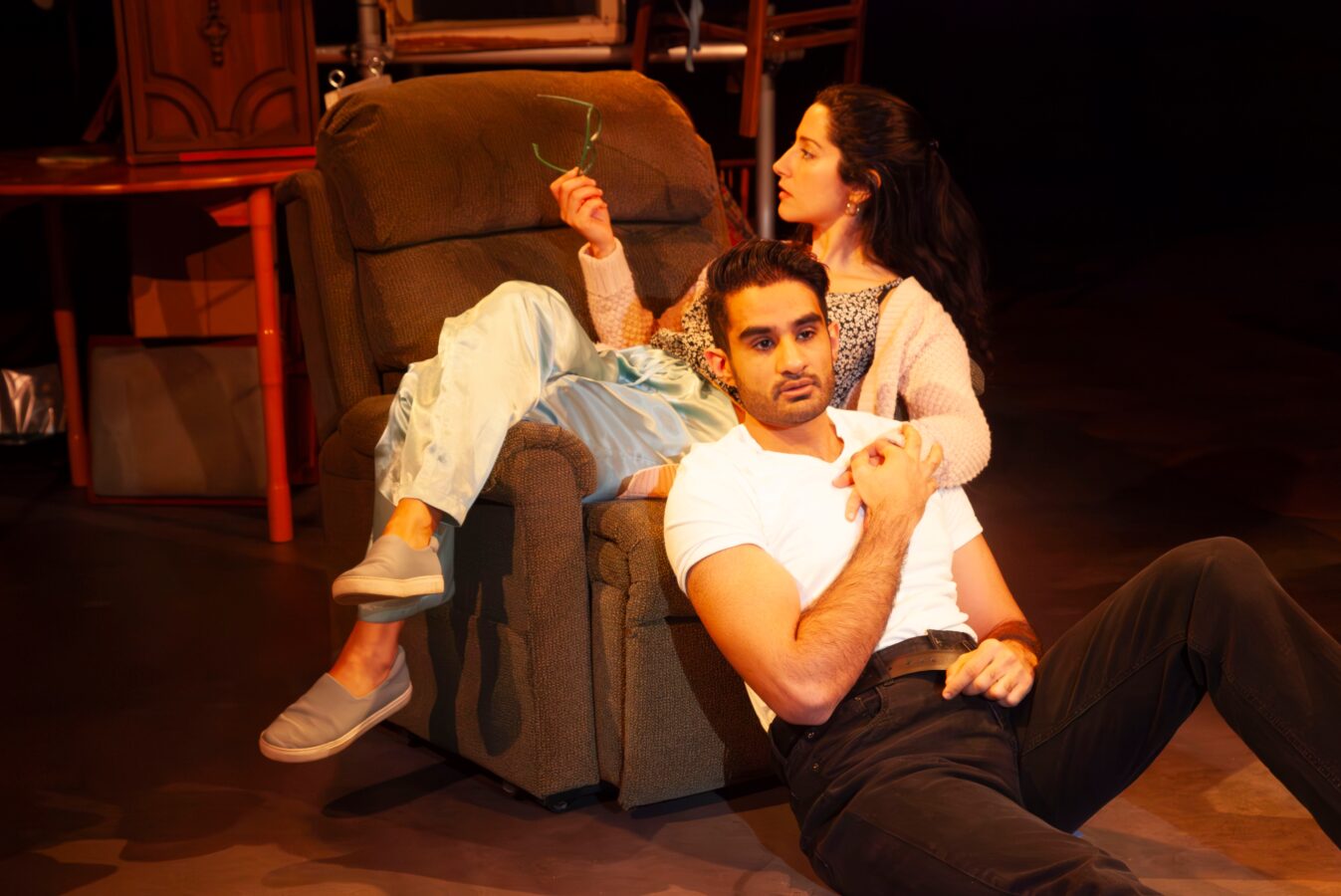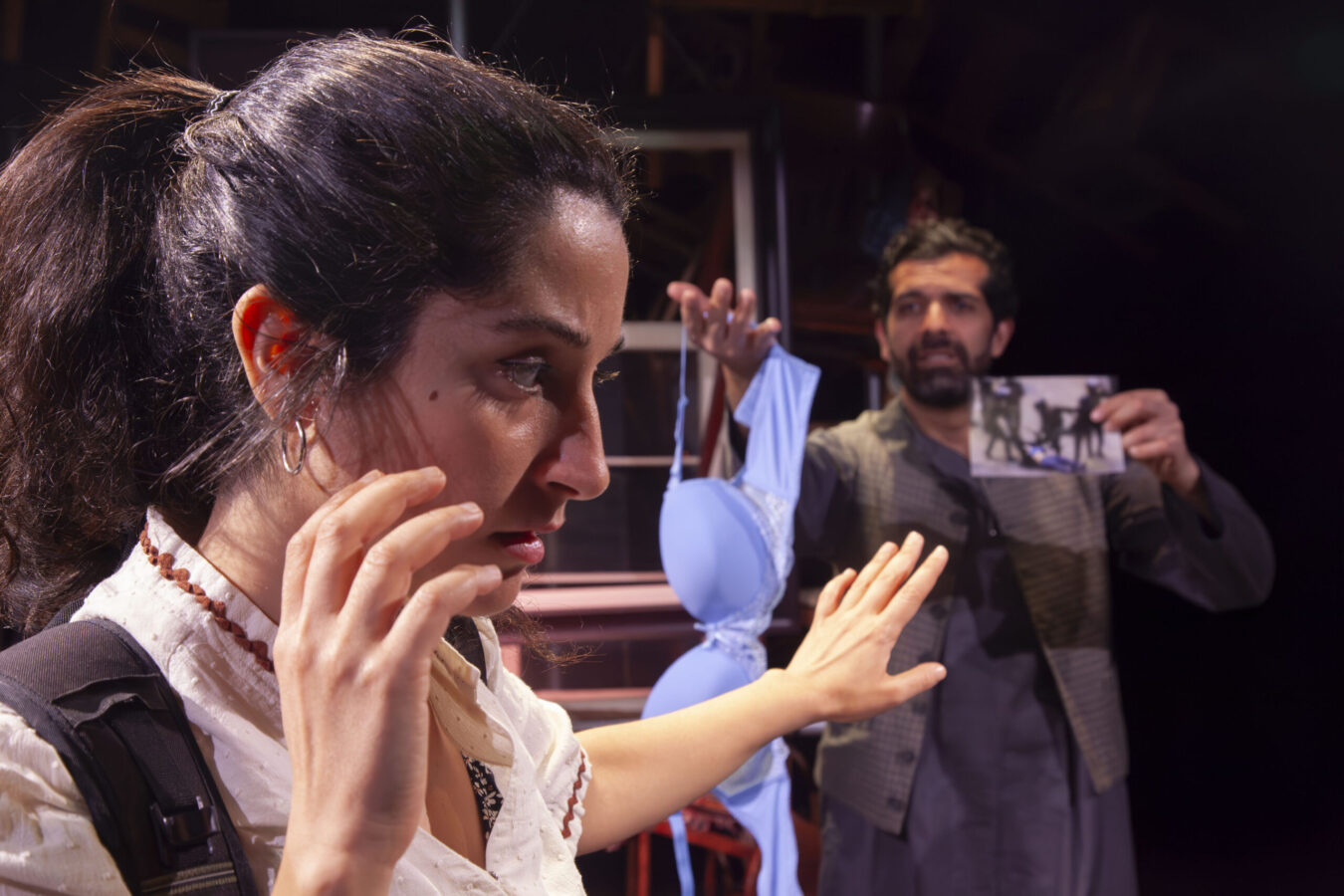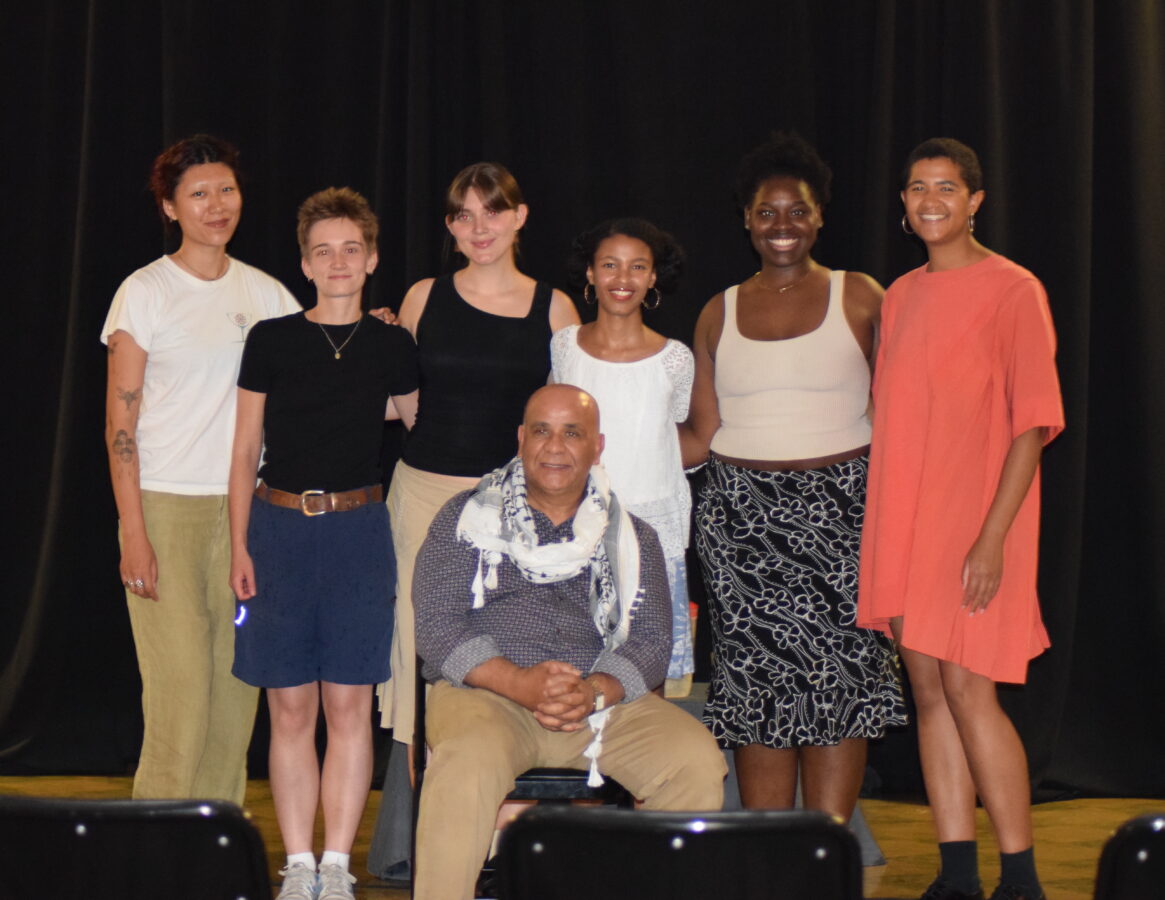The reality of ongoing genocide
It is hard to believe that more than 25 months have passed since the latest phase of the ongoing genocide in Gaza began, resulting in close to 68,000 Palestinians killed at time of publication and their deliberate starvation in real time, all unfolding before the eyes of the world.
Despite the reality of ongoing genocide, there is a troubling trend of censorship and denial of these atrocities by many Western countries. They remain silent in their national media, political discussions and public institutions. How do we reconcile the gap between those who recognize the war, violence and genocide, both historically and in the present day, and those who actively deny it? However, it is not only Western governments that have chosen silence; much of the art community and industry has also decided to ignore the blatantly visible genocide. By remaining silent, they are inadvertently supporting the cultural erasure that accompanies genocide.
Teesri Duniya Theatre’s most recent season, titled “Staging Freedom,” served as a cultural front aimed at uniting people and galvanizing public support for a ceasefire, long-term peace and freedom from colonial occupation. It sought to address and stop genocide while countering the alarming global rise of Islamophobia and antisemitism. This initiative was not only a theatrical response to war and genocide but also a form of decolonizing theatre.
This article emerges from a study, during which I interviewed 14 theatre practitioners and audience members and analyzed Teesri’s efforts at community building and mobilizing public opinion through the lens of decolonization.
This article emerges from a study, during which I interviewed 14 theatre practitioners and audience members and analyzed Teesri’s efforts at community building and mobilizing public opinion through the lens of decolonization. “Staging Freedom” decolonizes by bringing people together in art that undermines the settler-colonial project and by presenting echoes between the Israeli settler-colonial practice of Indigenous elimination and Canada’s settler-colonial project. Based on Teesri Duniya Theatre’s “Staging Freedom” activities, including play productions, book talks and art installations, I advocate for a decolonizing of theatre that engages audiences and artists in art presenting a counter-narrative to media that stays silent on genocide.
Finding humanity
“Can you tell me about yourself?”
“I’m on a journey to reconnect with my humanity… I’m trying to do some work that helps me be in touch and in tune with humanity. And find a way to contribute.”
One actor shared her desire to reconnect with her humanity as an essential part of her self-introduction. This desire to find humanity in the face of the blatant disregard for Palestinian life and culture is this study’s most salient finding. Participants joined “Staging Freedom,” wishing for theatre to be a shared space for living and for recognizing others’ humanity. Many participants stressed the importance of having diverse experiences in each room during the art-making process, where all could come together to remind each other “that they were real people with real lives.”[1]
“Staging Freedom” recognized the humanity of both its artists and its audiences. It was in that recognition that audience members transformed from silent observers to community members. Jenn Cole, a researcher working on Indigenous performance, described the work of Monique Mojica, a Guna and Rappahannock playwright and director who participated in “Staging Freedom,” as having “loved [the audience] into responsibility”.[2] Teesri’s season and its artists similarly recognized the humanity of the audience, giving them the ability to participate meaningfully.
The participants in this study were of all genders and their ethnicities varied: white Jewish, First Nations, Middle Eastern, South Asian, Latin American and Caribbean.
I interviewed theatre makers and audience members alike to measure the impacts of this season. As part of creating “Staging Freedom,” theatre practitioners were involved in a process of knowledge-making as well as art-making. As a testament to Teesri’s deep community engagement, the audience members interviewed were all introduced to Teesri through their networks. The participants in this study were of all genders and their ethnicities varied: white Jewish, First Nations, Middle Eastern, South Asian, Latin American and Caribbean. I conducted semi-structured interviews with the flexibility to ask follow-up questions. The questions ranged from their individual experiences and backgrounds to their understanding of decolonization practices.
Participants shared that they joined this season out of a desire to “humanize Palestinians.” This motivation is consistent with Varghese’s findings from interviews and informal conversations with Palestinian theatre makers.[3] The actors of this season’s multiple productions and installations wished for Palestinian characters to be viewed as more than vessels for suffering and trauma. These theatre makers considered their work essential to presenting the “human face” of Palestine.[4]
To find humanity is also to present Palestinian stories with care and authenticity.
To find humanity is also to present Palestinian stories with care and authenticity. When audience members first walked in to see Two Birds, One Stone, they were offered a cup of mint tea with rosewater. One participant felt that it was essential for the audience to feel cared for. Some audience members were given an envelope, which was later revealed to be a list of Palestinian artists killed in the genocide. The audience members held on to these envelopes throughout the show, and many chose to take them home.
The theatre makers’ care increased the level of audience engagement. One audience member shared that they left the show feeling responsible and committed to going beyond passive witnessing into engagement and network-building within the Teesri community. This audience member had a connection to Teesri formed over years of attending friends’ events and volunteering. In recognizing the audience’s humanity, Teesri directly opposes the “othering gaze” of the colonial patriarchy by reminding us of our potential to participate meaningfully in this world.[5] In that sense, Teesri builds a community that counters colonial interests through recognizing its members’ humanity.

As a play, Two Birds, One Stone deftly touches on the question of land. The play was written by two friends, Rimah Jabr and Natasha Greenblatt, and directed by Murdoch Schon. The production depicted the friendship between a Palestinian and a Jewish-Canadian in search of their ancestral homes. The Israeli settler-colonial project was shown to obstruct Rimah’s connections to the land as she struggled with entry points and borders. The play did not obscure the colonial violence responsible for making her grandmother’s home obsolete. Francesca Albanese, UN special rapporteur on the Occupied Palestinian Territories, described the play on her social media as a show that is more than a “dialogue between a Palestinian and an Israeli, on stage, face to face.” It is a truthful showing of the Palestinian occupation.
Teesri’s production of Keffiyeh/Made in China (KMIC) is another example of the articulation of Palestinian humanity and culture. As an occupation play, it depicted parents debating which fruits to buy for their son and a couple hoping to be intimate with each other. KMIC staged the mundane aspects of Palestinian life, culture and family, and, as a result, it humanized Palestinians and connected us to their stories. Written by Dalia Taha and directed by Chelsea Dab Hilke, Keffiyeh/Made in China showed us real human lives.

Many of the Palestinian and Middle Eastern participants discussed the importance of humour in telling Palestinian stories. Humour was described as part of the culture and a coping mechanism for the absurdity of the violence and loss experienced.
“Dealing with uncertainty, of course. Somehow, you will find a way to mix surrealism with absurdism. With humour.”
As illustrated by those words from a Palestinian participant, dealing with such trauma and violence is only possible with humour: it enables us to move forward. A Middle Eastern participant remarked, “When a bomb goes off in the morning, you still have to go grocery shopping in the afternoon,” touching on the resilience needed to continue living. Humour also served as a bridge to the audience throughout the season, a way to rope them into the stories. As one audience participant recalled,
“It was humorous. So, I wanted to dig into that more after I had seen it.”
To tell anti-colonial stories, participants, especially playwrights and directors, centred women’s voices in their art. For one actor, growing up as an Arab woman meant fewer acting opportunities, but by telling the stories of Palestinian women, she could positively represent and see herself represented. For the playwrights, women’s voices are essential to telling counter-hegemonic stories. The telling of feminine stories is inextricable from the desire to dismantle patriarchal settler-colonial narratives. As seen in Mojica’s work, racial and gendered violence are bound to settler-colonial greed and land theft.[6] The desire to counter dehumanizing settler-colonial narratives by presenting women’s stories was a common one for the participants.

A counterpublic
Over the past year, Teesri has collaborated with Independent Jewish Voices (IJV) and other groups to organize art installations, poetry readings, music concerts, film showings and other art-related events. During a book talk collaboration with IJV on Palestinian solidarity, the panel emphasized that rather than demanding inclusion in Jewish mainstream institutions, there is power in strengthening your own community. Rather than looking for inclusion in Zionist institutions or groups, the panellists built their own community that stands in solidarity with Palestinians.
What Teesri’s season shows us is that to decolonize the discourse, we cannot demand inclusion and representation in the mainstream. Instead, we can shift our gaze away from the dominant oppressive discourse and create our willing public. Varghese describes this process as the creation of an “abject counterpublic.”
“Staging Freedom” created such an abject counterpublic, a place for marginalized voices to be represented in a decolonization effort. As Tyler argues in her discussion of social abjection, decolonization happens when sites of subjection are reclaimed as sites of transformation and revolt.[7] Such reclamation is a conscious process that emerges in response to exclusion from the dominant sphere.[8] Teesri does not seek to replace inauthentic representations of Palestinians in the public sphere but creates its own. It did not wait for other theatres to present Palestinian stories; instead, it created an opportunity to stage freedom.
Through talkbacks, accompanying poetry readings, music and dialogue, Teesri built a counterpublic committed to resistance.
I propose the idea of “embodied resistance literature” to describe Teesri’s past season of theatre. While the term “resistance literature” refers to written texts, which Harras describes as containing the aspirations and struggles of subjected groups and their liberation movements,[9] the embodied aspect of theatre is essential to resistance and community building. As an enactment of resistance literature, theatre is an adequate field to study Palestinian self-determination and resistance as it actualizes colonization for observation.[10] In tandem with other artistic forms, the theatrical form can expose material colonization. Through talkbacks, accompanying poetry readings, music and dialogue, Teesri built a counterpublic committed to resistance.
As a “political theatre,” a term coined by Erwin Piscator and Mikhail Bakhtin to describe the potential for theatre to be effective in agitation, Teesri understands that theatre is not just a performance, but a platform to spotlight injustices. Piscator described the political style as one that gives unliberated people freedom and ownership of their world by communicating critical responses to social issues and affecting politics.[11]
Teesri started its Gaza Monologues as a response to war and occupation, leveraging political theatre as a transformative tool.[12] Teesri called on theatre artists, poets, writers and community members to create original monologues that were directly aimed at the Canadian government, opposing parties and other world leaders.[13] In the five iterations of the Gaza Monologues, the Teesri community called for a ceasefire and the end of Israeli occupation.[14]
By staging Palestinian stories, Teesri and other theatres act directly, countering the erasure of Palestinian culture, families and history in the mainstream. The articulation of Palestinian culture undermines Zionist hegemonic discourse and the Zionist founding myth of Palestinian inexistence.[15] Israeli justifications for anti-Palestinian violence reside in the denial of Palestinian life and historicity, but art can undermine these justifications. In Teesri’s own Backyard Theatre, The Shortest and Sweetest of Songs took place. Rooted in Palestinian poetry and music, this performance of sound, movement and image invited audience members into its portrayal of Palestinian radical reimagination and resistance to Israeli violence.
Teesri’s portrayals of Palestinian stories undermine Israeli-centric media, which obscures the colonial nature of Israeli aggression and instead portrays “both sides” as being equally violent, or Palestinians as particularly inhumane.
The increased censorship of Palestinians and criticisms of Israel, and the distortion of Palestinian resistance into acts of “terrorism,” underpins the settler colonial project. In support of Israel, the U.S. sanctions against Francesca Albanese set a frightening precedent of censorship.
The support of the U.S. and many other Western countries for Israel lies in their shared interests: that white settler-colonial societies should prevail. Ironically, Albanese’s calls to end the genocide against Palestinians were framed as “warfare” against the U.S. and Israel.[16] Theatres, however, can go against this violent rhetoric by choosing to articulate Palestinian culture, showcasing generations of traditions and connections to the land that are essential to decolonizing the discourse.
Decolonizing theatre
Finding humanity and building a counterpublic are part of a community-building process, which requires dialogue. More than reading and writing, theatre enables us to be together at the same time, to be challenged and to be decolonized. Throughout the “Staging Freedom” season, prominent figures outside of the local community were invited to lead discussions around intercultural and intercommunity solidarity, including Francesca Albanese and Monique Mojica. To have conversations that build solidarity among marginalized communities on Turtle Island is decolonizing.
As a special rapporteur for the UN on the occupied Palestinian territories, Albanese contributed a unique perspective and depth of knowledge to the community. Albanese agreed to lead a talkback for Two Birds, One Stone; given her familiarity with the topic, she enabled the participants to speak openly of the Palestinian genocide in an informative discussion.
During the run of Keffiyeh/Made in China, Monique Mojica was invited for a conversation with Rahul Varma, Teesri’s artistic director, and the community. In their community dialogue, “From Turtle Island to Palestine: Solidarity in Struggle, Indigenous Resistance, and the Power of Cultural Boycott,” Mojica and Varma examined the deep connections between Palestinian solidarity and Indigenous land struggles and resistance on Turtle Island. Devoted to resistance, Mojica is a member of PACBI (Palestinian Campaign for the Academic and Cultural Boycott of Israel). She believes in land-based embodied research and culturally specific Indigenous dramaturgies. By asking for permission before she spoke, she reminded the audience of their locality and responsibility. The community was able to see the strong echoes between occupied Turtle Island and the settler-colonial state of Canada, and Palestine’s relationship to Israel.
Solidarity is also possible through theatrical syncretism, which mixes different cultural elements together. Balme considers syncretic theatre, a conscious strategy that emerges from a colonial or post-colonial experience, to be an effective way to decolonize the stage.[17] Through cultural interaction and exchange, colonized peoples combine elements of European and Indigenous cultures in a creative combination.[18] While I am skeptical of the decolonizing power of European culture, I appreciate Balme’s caution that theatrical syncretism is different from “exoticism,” as in syncretism, theatre makers come from Indigenous cultures and understand the cultural codes.[19] It is important to note that syncretism has transformed in meaning, from denoting “impurity” to signalling reinterpretation and invention.[20]
By bringing in an Indigenous theatre practitioner to lead a community discussion, Teesri strategically combined Palestinian and Indigenous cultural elements to create a new form of post-colonial theatre experience.
By bringing in an Indigenous theatre practitioner to lead a community discussion, Teesri strategically combined Palestinian and Indigenous cultural elements to create a new form of post-colonial theatre experience. Indigenous theatre practitioners on Turtle Island have wished to put Indigenous performance in dialogue with other nations, both from Turtle Island and globally.[21] Responding to the occupation of Palestine and genocide of Palestinians on Turtle Island creates a “recombination” of Indigenous and Western cultures. The engagement of Indigenous cultures of Palestine and Turtle Island, as well as Western audiences, is decolonizing. Theatre and performance are counter-hegemonic acts of self-determination[22] and can undermine the settler-colonial ideology. As an actor of this season remarked, Teesri’s productions are only possible outside of Palestine and the Middle East.
Natasha from Two Birds, One Stone says, “Our play is about land.”
“Staging Freedom” as a season is likewise about land and countering occupation.

[1] Varghese, Gabriel. 2020. Palestinian Theatre in the West Bank: Our Human Faces. Palgrave Macmillan.
[2] Cole, Jenn. 2024. “Izzie M.: The Alchemy of Enfreakment: Introduction.” In Staging Coyote’s Freedom, edited by Monique Mojica and Lindsay Lachance, 237–43. Playwrights Canada Press.
[3] Varghese, Gabriel. 2020. Palestinian Theatre in the West Bank: Our Human Faces. Palgrave Macmillan.
[4] Varghese, Gabriel. 2020. Palestinian Theatre in the West Bank.
[5] Cole, Jenn. 2024. “Izzie M.: The Alchemy of Enfreakment: Introduction.” In Staging Coyote’s Freedom, edited by Monique Mojica and Lindsay Lachance, 237–43. Playwrights Canada Press.
[6] Mojica, Monique. 2023. “Prologue.” In Chocolate Woman Dreams the Milky Way: Mapping Embodied Indigenous Performance, 1–8. University of Michigan Press; Alanazi, Maha S. 2025. “Resisting the Romanticized Colonial Portrayal of Native American Women in Monique Mojica’s Play Princess Pocahontas and the Blue Spots.” Journal of Language Teaching and Research 6 (2): 639–48.
[7] Tyler, Imogen. 2013. “Chapter 1: Social Abjection.” In Revolting Subjects: Social Abjection and Resistance in Neoliberal Britain, 28–56. Zed Books.
[8] Varghese, Gabriel. 2020. Palestinian Theatre in the West Bank: Our Human Faces. Palgrave Macmillan.
[9] Harras, Azza. 2025. Theatre and the Israel-Palestine Conflict: Identity, Resistance and Contested Narratives. I.B. Tauris.
[10] Harras, Azza. 2025. Theatre and the Israel-Palestine Conflict: Identity, Resistance and Contested Narratives. I.B. Tauris.
[11] Piscator, Erwin. 1978. The Political Theatre: 1914-1928. Avon Books.
[12] Ryan, Sean Gordon and Rahul Varma. 2025. “What Does Un-Taking Sides Mean in a World Engulfed in Un-Ending Wars?” TURBA. The Journal for Global Practices in Live Arts Curation 5 (1): 80–7.
[13] Ryan, Sean Gordon and Rahul Varma. 2025. “What Does Un-Taking Sides Mean?”
[14] Ryan, Sean Gordon and Rahul Varma. 2025. “What Does Un-Taking Sides Mean?”
[15] Varghese, Gabriel. 2020. Palestinian Theatre in the West Bank: Our Human Faces. Palgrave Macmillan.
[16] 2025. “UN Gaza Investigator Francesca Albanese Says US Sanctions Against Her a Sign of ‘Guilt’.” The Guardian. https://www.theguardian.com/world/2025/jul/11/francesca-albanese-un-gaza-investigator-us-sanctions-guilt
[17] Balme, Christopher B. 1999. Decolonizing the Stage: Theatrical Syncretism and Post-Colonial Drama. Clarendon.
[18] Balme, Christopher B. 1999. Decolonizing the Stage.
[19] Balme, Christopher B. 1999. Decolonizing the Stage.
[20] Balme, Christopher B. 1999. Decolonizing the Stage.
[21] Archibald-Barber, Jesse Rae, Kathleen Irwin, and Moira J. Day, eds. 2019. Performing Turtle Island. Indigenous Theatre on the World Stage. University of Regina Press.
[22] Varghese, Gabriel. 2020. Palestinian Theatre in the West Bank: Our Human Faces. Palgrave Macmillan; Archibald-Barber, Jesse Rae, Kathleen Irwin, and Moira J. Day, eds. 2019. Performing Turtle Island. Indigenous Theatre on the World Stage. University of Regina Press.







